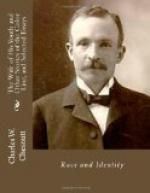IV
Just fifteen months after the date when uncle Wellington had left North Carolina, a weather-beaten figure entered the town of Patesville after nightfall, following the railroad track from the north. Few would have recognized in the hungry-looking old brown tramp, clad in dusty rags and limping along with bare feet, the trim-looking middle-aged mulatto who so few months before had taken the train from Patesville for the distant North; so, if he had but known it, there was no necessity for him to avoid the main streets and sneak around by unfrequented paths to reach the old place on the other side of the town. He encountered nobody that he knew, and soon the familiar shape of the little cabin rose before him. It stood distinctly outlined against the sky, and the light streaming from the half-opened shutters showed it to be occupied. As he drew nearer, every familiar detail of the place appealed to his memory and to his affections, and his heart went out to the old home and the old wife. As he came nearer still, the odor of fried chicken floated out upon the air and set his mouth to watering, and awakened unspeakable longings in his half-starved stomach.
At this moment, however, a fearful thought struck him; suppose the old woman had taken legal advice and married again during his absence? Turn about would have been only fair play. He opened the gate softly, and with his heart in his mouth approached the window on tiptoe and looked in.
A cheerful fire was blazing on the hearth, in front of which sat the familiar form of aunt Milly—and another, at the sight of whom uncle Wellington’s heart sank within him. He knew the other person very well; he had sat there more than once before uncle Wellington went away. It was the minister of the church to which his wife belonged. The preacher’s former visits, however, had signified nothing more than pastoral courtesy, or appreciation of good eating. His presence now was of serious portent; for Wellington recalled, with acute alarm, that the elder’s wife had died only a few weeks before his own departure for the North. What was the occasion of his presence this evening? Was it merely a pastoral call? or was he courting? or had aunt Milly taken legal advice and married the elder?
Wellington remembered a crack in the wall, at the back of the house, through which he could see and hear, and quietly stationed himself there.
“Dat chicken smells mighty good, Sis’ Milly,” the elder was saying; “I can’t fer de life er me see why dat low-down husban’ er yo’n could ever run away f’m a cook like you. It ‘s one er de beatenis’ things I ever heared. How he could lib wid you an’ not ’preciate you I can’t understan’, no indeed I can’t.”
Aunt Milly sighed. “De trouble wid Wellin’ton wuz,” she replied, “dat he did n’ know when he wuz well off. He wuz alluz wishin’ fer change, er studyin’ ‘bout somethin’ new.”




